What was Wolfgang Petersen's Net Worth?
Wolfgang Petersen was a German film director and writer who had a net worth of $20 million at the time of his death. Wolfgang Petersen died on August 12, 2022 at the age of 81.
After directing his breakthrough 1981 German war film "Das Boot," which netted him two Academy Award nominations, he went on to have a prolific career in Hollywood with such films as "The NeverEnding Story," "In the Line of Fire," "Outbreak," "Air Force One," and "Troy." His final film as a director was the 2016 German crime comedy "Vier Gegen Die Bank," a remake of his 1976 television film.
Early Life and Education
Wolfgang Petersen was born on March 14, 1941 in Emden, Nazi Germany as the son of a naval officer. As a youth, he went to the Gelehrtenschule des Johanneums in Hamburg. While still in school, Petersen made his first films with an 8 mm camera. Later, as a young adult in the 60s, he directed plays at the Ernst Deutsch Theater. Petersen subsequently enrolled at the Film and Television Academy in Berlin, graduating in 1970.
Television Career
Petersen began his directing career on German television. His first project was the 1965 television film "Stadt auf Stelzen," a recording of a play. Later, in 1971, Petersen started directing and writing for the police procedural series "Tatort," one of Germany's most popular shows. He remained on the series through 1977. Petersen directed a number of other productions for television throughout the decade, including "Smog," "Aufs Kreuz Gelegt," "Stellenweise Glatteis," and "Vier Gegen Die Bank." His final pair of television films were 1977's "Die Konsequenz" and 1978's "Schwarz und Weiß wie Tage und Nächte."

Getty
Film Career, Part 1
After directing a few short films, Petersen made his theatrical film debut in 1974 with the psychological thriller "One or the Other of Us," based on the eponymous novel by Horst Bosetzky. Following this, he had his international breakthrough with the World War II submarine film "Das Boot," which came out in 1981. A critical smash, the film earned six Academy Award nominations, including two for Petersen's directing and writing. Petersen went on to write and direct his first English-language film, the 1984 fantasy "The NeverEnding Story." Based on the Michael Ende novel, the film was a critical and commercial hit. Less successful was Petersen's next film, the science-fiction film "Enemy Mine," based on Barry B. Longear's novella. Starring Dennis Quaid and Louis Gossett Jr. as a human and alien soldier, respectively, the film flopped at the box office.
Following another critical and commercial bomb, the psychological thriller "Shattered," Petersen returned to success with his 1993 political thriller "In the Line of Fire." The Clint Eastwood-starring film earned three Academy Award nominations, including Best Supporting Actor for John Malkovich. Petersen continued to direct thrillers following this success. In 1995, he directed the medical disaster thriller "Outbreak," based on Richard Preston's non-fiction book "The Hot Zone" about viral pandemics. Featuring an all-star cast including Dustin Hoffman, Kevin Spacey, Rene Russo, Morgan Freeman, Cuba Gooding Jr., and Donald Sutherland, the film was a major box-office hit. Petersen had another hugely profitable film in 1997 with the political thriller "Air Force One," starring Harrison Ford as fictional US President James Marshall.
Film Career, Part 2
Petersen began the 21st century with "The Perfect Storm," a disaster film based on the eponymous non-fiction book by Sebastian Junger. Starring George Clooney, Mark Wahlberg, and Diane Lane, among others, it was a box-office hit. Next, Petersen directed the 2004 historical epic "Troy," based on Homer's "Iliad" and starring Brad Pitt, Eric Bana, Orlando Bloom, and Diane Kruger. The film was another solid commercial success for Petersen. He followed this in 2006 with the disaster film "Poseidon," a retelling of both the novel "The Poseidon Adventure" and its popular 1972 film adaptation. Ultimately, the film was unable to match the success of its predecessor, floundering with both critics and audiences.
In the years after "Poseidon," Petersen was in talks to direct film adaptations of the science-fiction novels "Ender's Game" and "Old Man's War." He was also potentially going to direct a live-action adaptation of the anime film "Paprika." Ultimately, he did not realize these projects. Following a ten-year hiatus from the big screen, Petersen made his return in 2016 with the crime comedy "Vier Gegen Die Bank," a remake of his television film from 1976, which was itself an adaptation of Ralph Maloney's book "The Nixon Recession Caper." The film, Petersen's first in his native German language since 1981's "Das Boot," would be his last directorial credit.
Personal Life and Death
Petersen married his first wife, Ursula Sieg, in 1970. They had a son before divorcing in 1978. That year, Petersen wed his assistant Maria Borgel, with whom he remained until his passing.
In August of 2022, Petersen died from pancreatic cancer at his home in Los Angeles. He was 81 years of age.
Read more: Wolfgang Petersen Net Worth



0 Comments